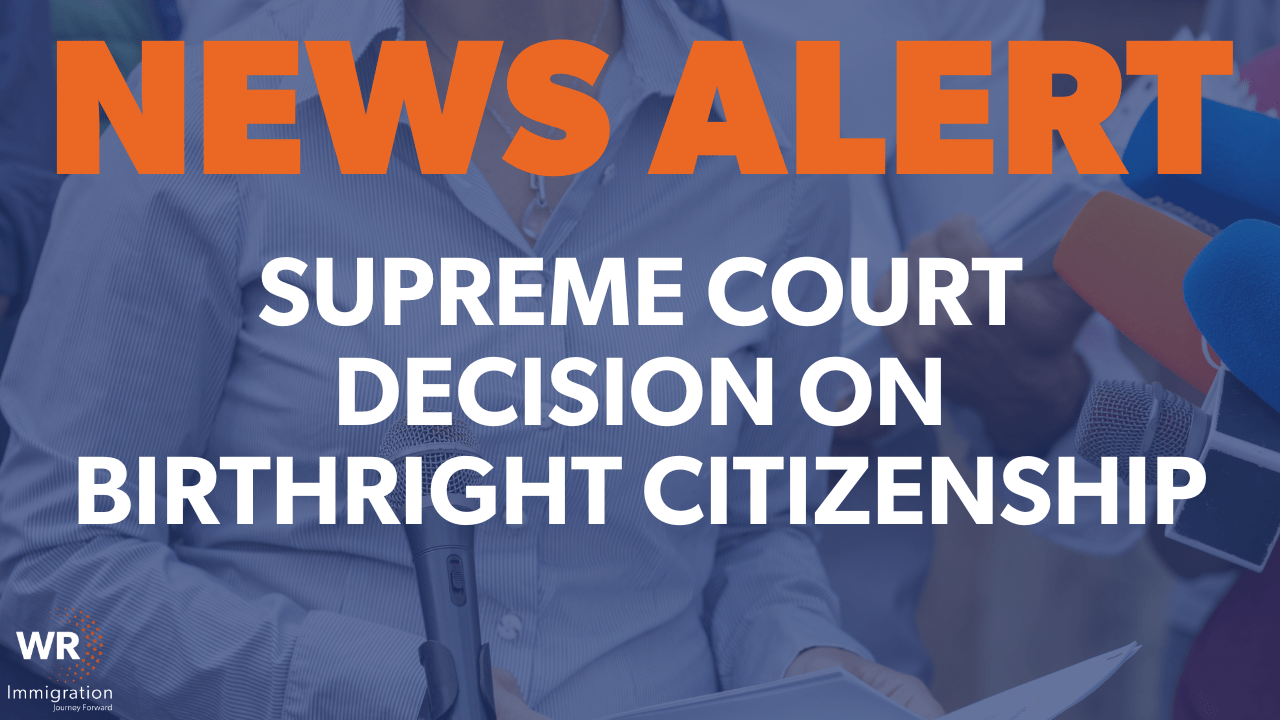The Supreme Court issued an important decision today in cases challenging President Trump’s Executive Order on birthright citizenship. The Court limited its decision to federal courts’ ability to issue nationwide injunctions, allowing the government to move forward with implementation of the Order, but leaving open the possibility of legal challenges to the Order and its implementation.
Justice Amy Coney Barrett authored the majority opinion, which did not address whether President Trump’s executive order on birthright citizenship is constitutional. The Court focused its decision on the procedures federal courts must follow, and the orders federal courts can issue, when states and citizens challenge actions of the federal government. The Court’s decision today means there will be continuing and evolving legal challenges to the birthright citizenship order in the federal courts.
Nationwide Injunctions
Generally, the Court limited federal courts’ ability to issue nationwide injunctions to executive orders and broad national policies. It explained that courts should normally only block federal policies for the individuals or organizations that bring a lawsuit, unless a statute or class action process allows broader relief. This ruling makes it less likely that a single lawsuit will be able to stop a federal policy from taking effect across the entire country.
Birthright Citizenship
The decision did not address the merits of the Executive Order; it only addressed the scope of the lower court’s injunctions barring the Order’s implementation. The Executive Order states that the federal government should not recognize the United States citizenship of certain children born since January 20, 2025. The Supreme Court’s order limits the broad injunctions issued by lower courts against the implementation of the Order. The Supreme Court left those injunctions in effect with respect to the parties to the several lawsuits before the Court. The lower courts are ordered to modify the scope of their orders in those lawsuits “expeditiously.”
The Supreme Court’s order also incorporates a change to the effective date of the Executive Order agreed to by the government. The Court states that the Executive Order does not apply to children born since January 20, 2025, and for 30 additional days after today’s order. Under the decision, all children born in the United States before July 28, 2025, regardless of their parents’ immigration status, will be recognized as United States citizens by the Executive Branch of the federal government.
Between now and Sunday, July 27, 2025, we anticipate additional changes.
- Additional Trump Administration Agency Actions: Today, at a press conference, President Trump indicated that the administration plans to take additional actions to end birthright citizenship. These efforts will likely take the form of new agency rules, policies, and guidance aimed at implementing the executive order.
- New Challenges to Agency Actions: Filed within hours of the Supreme Court’s decision, a lawsuit in New Hampshire seeks to designate a nationwide class of children needing protection from the Executive Order. A “class action” lawsuit asks the court to recognize one or more individual plaintiffs as representatives of a class of similarly situated individuals; in this case, all children in the United States with parents who lack permanent resident status. Additionally, future agency actions taken to implement the Executive Order will be subject to challenge under the Administrative Procedure Act (APA), which allows courts to “set aside” unlawful agency actions and prevent the agency from taking those actions, even against individuals who are not parties to the specific lawsuit. These anticipated agency actions and related legal challenges will likely impact when and how the Executive Order actually goes into effect.
- Future SCOTUS Case: Although the Supreme Court concluded its regular term today, it can still hear cases on an emergency basis during the recess. If the administration moves quickly to implement new rules affecting birthright citizenship, and those actions face legal challenges, the Court will likely be asked to intervene on an expedited basis. The emergency docket allows the Court to issue temporary rulings, such as stays or injunctions. Regardless of how the immediate legal battles unfold, we expect the constitutional question at the heart of this issue, whether the Fourteenth Amendment guarantees birthright citizenship to all individuals born on U.S. soil, to reach the Supreme Court in a future term.
On Sunday, July 27, absent additional developments, Section 2 of the Executive Order will go into effect, limiting federal recognition of the United States citizenship of many children born in the United States.
ACTION ITEM
If you or any of your family may be impacted, we advise that you apply for a US passport or Certificate of Citizenship immediately. If you need assistance, reach out to your WR attorney or to VisaLaw@wolfsdorf.com if you need to schedule a professional consultation.
The next few months will be critical, with potential policy changes and legal developments ahead. We are monitoring the situation closely and will keep you informed as new information becomes available.


